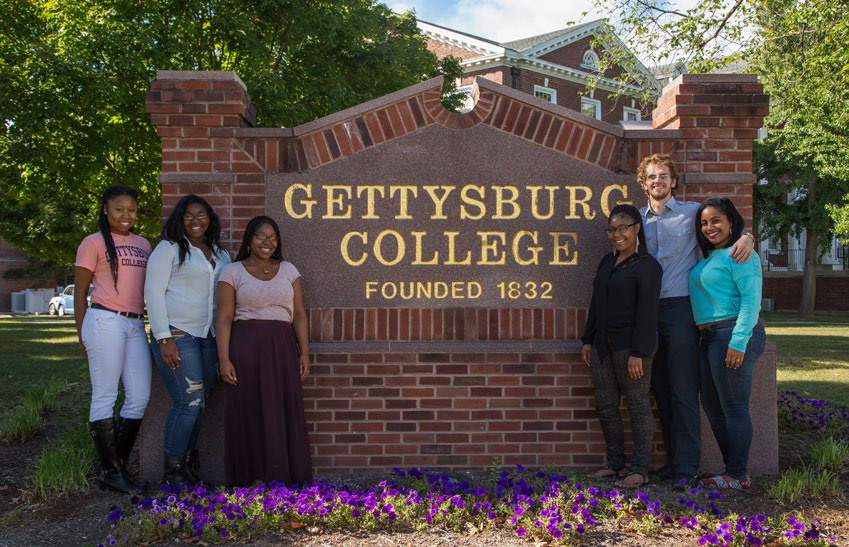Gettysburg celebrates Philadelphia Futures

Philadelphia Futures students pose in front of Gettysburg College’s sign. Photo Credit: gettysburg.edu
Courtesy of GCC&M
Unique Patterson ’10 and Vasiljon Çobo ’14 both admit that, as high school seniors, Gettysburg College was not on their list of potential schools.
Patterson, a first-generation- to-college student, was interested in historically black colleges like Howard and Hampton. Çobo, who immigrated to Philadelphia from Albania as a child, had attended college preparatory classes at larger Philadelphia universities like Temple and Drexel, and had envisioned a more urban college experience.
But as participants in Philadelphia Futures—an organization that supports the city’s low-income, first-generation-to-college students as they prepare for, apply to, and pursue a post-secondary education—Patterson and Çobo were urged to consider Gettysburg.
A small, private liberal arts college in a rural community was “a very different world from the one I experienced every day in Philadelphia,” Çobo said, “and I think that is where the Office of Intercultural Advancement really comes in. They showed me what I could bring to this campus and that I was wanted here. This idea of a sort of reciprocity… really made me feel validated.”
Last week, nearly 200 Gettysburg alumni and Philadelphians gathered to celebrate the success of 35 Philadelphia Futures students—students like Patterson and Çobo—who have graduated from or are currently attending the College.
At the event, Gettysburg College was honored for its commitment to diversity, and for its 12-year partnership in helping these students thrive.
Gettysburg’s partnership with Philadelphia Futures began in 2001. Darryl Jones, Gettysburg’s senior associate director of admissions, and Joan Mazzotti, executive director of Philadelphia Futures, sought to create a pipeline through which the College and the program would collaborate to prepare, recruit, and retain these students.
“Our partnership was cutting- edge,” said Mazzotti. “Gettysburg would bring to its campus talented students who would enrich the college community with a diversity of background, thought, and experience. Philadelphia Futures would have a partner helping our students transition to and succeed in college. And most important, our students would have an opportunity that would otherwise be foreclosed to them.”
The partnership is especially important today as Philadelphia public schools are struggling. Its students face daunting graduation rates; the Class of 2012’s rate was 66 percent—the highest in recent history—and of those who do graduate, only 36 percent enroll in a post-secondary program and only 10 percent earn a degree.
Exacerbating the problem, budget cuts have forced many Philadelphia public schools to open without a full-time guidance counselor, or to share a single counselor among thousands of students.
While in high school, these students receive long-term, one-on-one mentoring, year-round academic enrichment activities (such as after-school and summer tutoring and college preparatory courses) and guidance in college preparation, application and success.
Once they arrive at Gettysburg, Philadelphia Futures students receive a full-need scholarship, and the College’s commitment to the program totals more than $6.2 million in institutional aid.
With the program’s help, Çobo created an IDS major to explore language and conflict and studied abroad in Spain.
Philadelphia Futures students’ success is due, in part, to an intensive advising and support program on campus. They attend weekly, one-on-one mentoring sessions at the Office of Intercultural Advancement, and speak with their mentors back in Philadelphia multiple times a semester.
During Patterson’s first year on campus, she felt overwhelmed by her coursework. She was not performing as well as she had hoped, and felt less prepared for college than her classmates. She began transfer applications.
When Dean Curry heard this news, he encouraged her to stay. He told her why he thought Gettysburg was a great school for her, and how she could succeed if she stayed. The Office of Intercultural Advancement invited her to participate in their Legacy Project, during which she learned about Gettysburg’s first African American student, Rev. Dr. Rudolph Featherstone ’56. This project ignited her academic passion, and she decided to pursue sociology and Africana studies.
Throughout this process, she notes, she was driven by an extreme sense of loyalty and responsibility to her mentors at the College and at Philadelphia Futures.
Today, Patterson carries the mantle of college access in her professional life. After graduating, she spent two years as a college adviser for low-income students in central Pennsylvania, and now— as an admissions counselor—she continues to encourage students through her own story. She has also recently been appointed to Gettysburg’s Alumni Board of Directors.
“I think Gettysburg and Philadelphia Futures have taught me to find something that you love, follow through on it, and find a way to help and give back to our society,” she said. “I will always use my experiences and story to advise students from all backgrounds that they, too, can have successful lives and do what they love.”
Over the past 12 years, 28 Philadelphia Futures students have earned their degrees from Gettysburg College, with another seven students currently enrolled. Through this partnership, Jones added, Gettysburg and Philadelphia Futures have helped these students outperform their educational backgrounds.
Perhaps it provides a bit of hope for the city, too.
